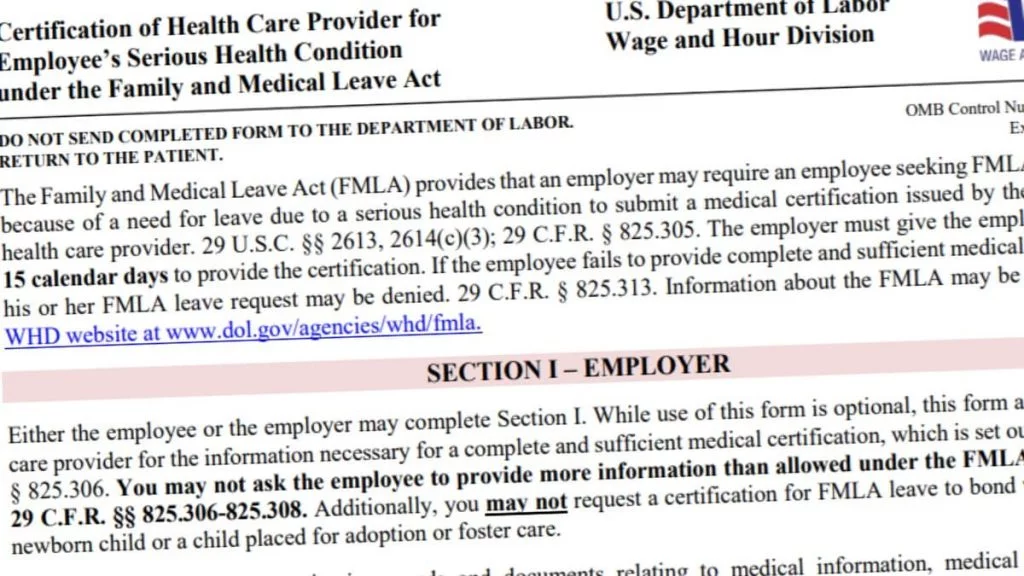When to Send FMLA Paperwork: Key Timing Tips

When it comes to navigating the Family and Medical Leave Act (FMLA) paperwork, timing is critical to ensure that your rights are protected and that your leave process is as seamless as possible. Understanding when to send your FMLA paperwork can save you from potential stress, confusion, and even denial of benefits. Here’s an in-depth guide to help you with the key timing tips when it comes to filing FMLA paperwork:
Understanding the Basics

Before delving into the specifics, it’s important to grasp the fundamentals:
- Eligibility: Employees must have worked for their employer for at least 12 months, accumulated at least 1,250 hours of service within the previous 12 months, and work at a location where the company employs at least 50 employees within 75 miles.
- Coverage: FMLA provides up to 12 weeks of unpaid, job-protected leave per year for various reasons such as childbirth or adoption, caring for a family member with a serious health condition, or recovering from a serious health condition oneself.
- Notification: An employee must notify their employer of the need for FMLA leave when it’s foreseeable, usually within 30 days of the leave’s onset.
When to Send Your FMLA Paperwork

To ensure that your leave is processed without delay, consider the following:
1. Anticipate the Need for Leave

If the need for leave is foreseeable, such as for a scheduled medical treatment or an expected childbirth:
- At least 30 days in advance: Submit your FMLA request to your HR department or supervisor. This allows your employer enough time to prepare for your absence and make necessary arrangements.
- Procrastination Can Cause Problems: Late notice might result in a delay in the start of your leave or affect your eligibility for job protection under FMLA.
2. When Leave Is Unforeseeable

For situations where the need for leave is sudden:
- As Soon As Practicable: Notify your employer as quickly as possible. The U.S. Department of Labor (DOL) states that notice should be provided within 1 or 2 business days after learning about the need for leave.
- Communication: If possible, provide verbal notice first and follow up with written documentation.
💡 Note: While the DOL doesn’t strictly define “as soon as practicable,” the general guideline is to inform your employer as soon as you’re aware of the need for leave.
3. During the Medical Certification Process

Your employer can request a medical certification to support your FMLA request:
- Within 15 Calendar Days: You usually have 15 days from the request to provide the certification. It’s beneficial to complete this promptly to expedite your leave process.
- Recertification: If your leave is ongoing, your employer might request recertification, but this should not be more than every 30 days unless circumstances change.
4. For Recurring Conditions

If you have a recurring condition like chemotherapy treatments:
- Requesting Leave: You may need to submit periodic FMLA paperwork to reflect your ongoing or intermittent leave schedule. Plan for these in advance.
- Keep Track: Since you can take FMLA intermittently, track your leave usage to ensure you don’t exceed the 12-week limit per year.
5. Return-to-Work Notifications

As your FMLA leave concludes:
- Fitness-for-Duty: You might be required to submit a fitness-for-duty certification before returning to work. Your employer should notify you of this requirement in advance.
- Return Notice: It’s courteous and in your best interest to inform your employer of your return to work to facilitate a smooth transition back to your role.
The Importance of Timing

The timing of your FMLA paperwork submission impacts:
- Leave Approval: Late or incomplete paperwork can lead to delays in approving your leave.
- Job Protection: Filing early helps ensure your leave is protected under FMLA, safeguarding your job.
- Communication: It allows your employer time to plan, communicate, and make necessary work adjustments.
In summary, understanding when to send your FMLA paperwork is vital for a hassle-free leave process. By submitting your request promptly, especially for foreseeable leave, you ensure your job is protected, your employer is adequately prepared, and your return to work is seamless. Taking the time to navigate FMLA paperwork correctly supports both your need for leave and your future with your employer.
What if I don’t submit FMLA paperwork on time?

+
Delaying your FMLA paperwork can lead to several issues including delayed leave, potential denial of FMLA benefits, and complications in job protection. Employers might be less accommodating if informed of a need for leave at the last minute.
Can I submit FMLA paperwork after my leave has already started?

+
Yes, if the leave was unforeseeable, you can submit the paperwork later, but you should inform your employer as soon as practicable. However, retrospective leave requests may complicate matters if not handled timely.
What if I need to extend my FMLA leave?

+
If you need to extend your leave, communicate with your employer as soon as you’re aware that additional time is necessary. You may need to provide updated medical certification to support the extension.
How should I handle FMLA paperwork for an intermittent leave?

+
For intermittent leave, keep meticulous records of your leave usage. Inform your employer of the dates you’ll be taking leave as soon as possible, and ensure that the necessary paperwork is in place to cover these periods.
What documentation is required for FMLA leave?

+
Typically, you’ll need to provide a medical certification from a healthcare provider. This certification should include the date the condition began, its probable duration, and the reasons for the leave (e.g., treatments, caregiving, etc.).



